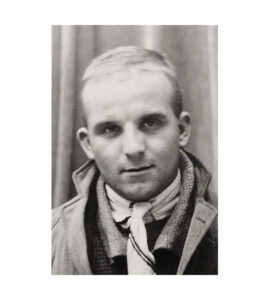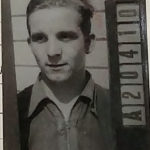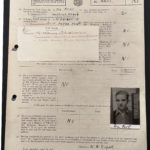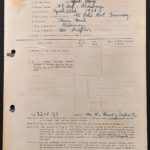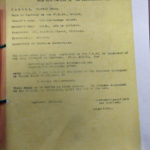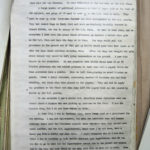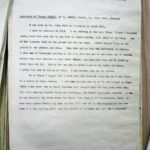Wilfred Henry Duport
- Date of Birth: April 23, 1926
- Place of Birth: Guernsey
- Date of Deportation: June 1944
- Address when Deported: 20 Fountain Street, St. Peter Port
- Place of deportation: Alderney
- Sites deported to: Norderney,
By Gilly Carr
Wilfred Henry Duport was born on 23 April 1926, making him 14 years old when the Germans occupied Guernsey. His parents were William George Duport and Edith Duport née de Carteret. At the time of the registration of Islanders in October 1940, he lived at 12 Cornet Street in St Peter Port. He moved several times within St Peter Port during the Occupation but, according to his registration card, he moved to Alderney on 24 June 1942. He appears not to have returned to Guernsey until June 1944.
By March 1943, Duport was living at ‘OT Hof’ (apparently the barracks of an OT farm) in Alderney and working as a farm hand for an employer named ‘Mr Knifler’, most likely an employer within the Organisation Todt.
Wilfred Duport comes to our attention because of the testimony he gave to war crimes investigators who came to the Channel Islands after the Occupation. Now residing in The National Archives, his testimony described various human rights abuses he witnessed. In addition to this, he spoke about his own experience in the following terms:
On 18 June 1942 I went to Alderney with the second party of 30 men who went on order of the States of Guernsey to do farm work for the Germany. We were billetted in the barracks at the O.T. farm. … In June 1944 I was in Norderney Camp, where I was sent as a punishment for not working. I was not ill-treated, but when the Americans came and bombed Alderney there were two Frenchmen outside their barracks when they should have taken shelter, and the O.T. Lagerfuehrer, whose name I do not know [probably SS-Untersturmführer Adam Adler], took a tommy gun from a sentry and shot them. I could recognise him if I saw him. While I was at Norderney an O.T. worker informed this Lagerfuehrer that he was too ill to go to work and the Lagerfuehrer struck him to the ground and kicked him in the face and body until he was only just able to move off to work. This man dropped unconscious when he reached his work and was taken in an ambulance to hospital, where he died the same day.
(Wilfred Dupont, May 1945, TNA WO 311/11)
A little more about Duport’s story can be gleaned from a court charge sheet, now existing in Guernsey’s Island Archives. This stated that on 7 August 1943, Duport was sentenced by judgement of the Army Tribunal St.L. 303/43 in Guernsey for ‘spreading anti-German information and abusing the occupying power’. He was given a three month sentence of imprisonment, of which three weeks was to be served as ‘close arrest’, with the balance suspended on 14 August 1943 on probation until the end of the war. From the available information, we cannot say for sure whether this was a separate offence to that which Duport described above. We can say, however, that Duport did not spend time in Guernsey Prison for this offence as his name does not appear in the register. We do not know what ‘close arrest’ meant for those working in Alderney at this time, and it is possible that he was sent to Alderney Gaol or sent to work on a particular working party. This first offence may be the reason why he was subsequently sent to Norderney Concentration Camp a year later for ‘not working’.
While the Frank Falla Archive does not usually record imprisonments in Alderney because Islanders usually arrived in the Island voluntarily, it has made a small number of exceptions in order to show the perilousness of the existence of Islanders who worked on the farms in Alderney during the Occupation. If they got on the wrong side of the occupiers, they could find themselves imprisoned in Alderney Gaol or one of the labour camps in the Island. They were also witnesses to human rights abuses in the island. Attempts by the Frank Falla Archive to contact authorities in Alderney today to study records of the prison has not yet resulted in any response. It is unknown whether – and is probably unlikely that – any such prison records still survive, but this cannot yet be stated with any certainty.
The Frank Falla Archive would like to invite the family of Wilfred Duport to get in touch to share further information, family documents or photos.
Sources
Wilfred Duport’s Occupation registration form, Island Archives, Guernsey.
Wilfred Duport’s 1942 Occupation registration form, Island Archives, Guernsey.
Wilfred Duport’s charge sheet, Island Archives, Guernsey, ref. CC14-05/21
Wilfred Duport’s testimony, The National Archives ref. WO 311/11.
Map
- Cemetery / Mass Grave
- Concentration Camp
- Forced Labour Camp
- Prison
- Worksite / Fortification
